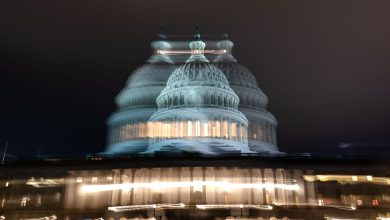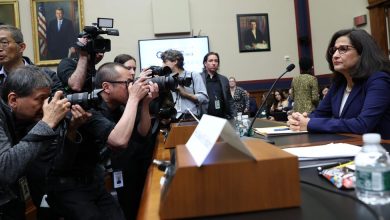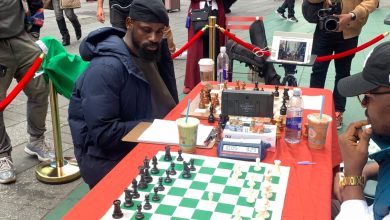When Picking Judges, Democrats Need to Stop Ignoring Economics

President Biden has argued more forcefully than any other president in recent decades that the government needs to limit corporate concentration and to prosecute abuses of corporate power. He has installed leading proponents of an antitrust revival at the White House, and at the Justice Department and the Federal Trade Commission, the major regulatory agencies.
But Mr. Biden is missing a crucial opportunity to push back against corporate power. To make a lasting change in the enforcement of antitrust laws, he needs to borrow a page from President Ronald Reagan’s playbook and put antitrust experts on the federal bench.
Mr. Reagan suspended the government’s efforts to check corporate power, adopting instead a policy best described as nonintervention in the life of large corporations. He made it stick, too. Since then, even Democratic administrations have treated antitrust law as obsolete.
The public face of Mr. Reagan’s paradigm shift was William French Smith, the corporate lawyer whom the president tapped as his attorney general, who declared in June 1981, “We must recognize that bigness in business does not necessarily mean badness.”
Much of the work, however, was done by a group of anti-antitrust academics picked by Mr. Reagan to serve as federal judges, including Robert Bork, Richard Posner and Antonin Scalia. The letter of the nation’s antitrust laws hasn’t changed, but those judges rewrote the meaning of the laws. To undo their work — to advance a new understanding of antitrust — it is necessary to put a new generation of intellectuals into black robes.
So far, there are no antitrust experts among the 27 people Mr. Biden has nominated to federal appeals courts, according to William Kovacic, who led the F.T.C. under President George W. Bush and is now a law professor at George Washington University. “There’s nobody who’s got that deep academic experience looking at economic regulatory matters,” Mr. Kovacic said.
Mr. Biden has a limited number of chances to pick judges and has other worthy priorities. He has emphasized the need for the judiciary to better reflect the nation’s diversity, and he has selected a significant number of public defenders, legal aid lawyers and civil rights lawyers.
But Mr. Biden needs to pay attention to economic justice, too. It is a mistake to assume that judges with progressive outlooks on social issues will necessarily favor constraints on corporate power. Some of the most celebrated liberal justices of recent decades, including Thurgood Marshall, Ruth Bader Ginsburg and Stephen Breyer, played key roles in gutting the nation’s antitrust laws. If the Biden administration is serious about checking the power of corporations, it needs to nominate jurists who are intellectually committed to that goal.
More than that. What’s needed are judges who can provide intellectual leadership. The courts, after all, don’t merely call balls and strikes. Appellate judges exert influence by picking cases that advance their agendas and by using narrow rulings to make broader arguments.
Academics associated with the University of Chicago, including Mr. Posner and Mr. Bork, built a case for sharply limiting antitrust enforcement during the 1970s. Their ideas began to take hold even before they were put on the bench. The Supreme Court issued one of its first rulings limiting the scope of antitrust enforcement in a 1977 case, Continental T.V. v. GTE Sylvania. Justice Lewis Powell Jr., who wrote the decision, left a scribbled record of his intellectual debts in the margin of a case memo. It read, “Posner, Baxter, Bork.”
Baxter was William Baxter, a Stanford law professor whom Mr. Reagan installed as the head of the antitrust division at the Justice Department. Mr. Posner and Mr. Bork ended up on appeals courts, where they became influential interpreters of antitrust law. Other important Reagan picks included Frank Easterbrook, a law professor at the University of Chicago; Douglas Ginsburg, a Harvard Law professor with a distaste for regulation; and, a few years later, Justice Scalia, whose opposition to antitrust enforcement is perhaps best illustrated by a case he did not decide. Shortly after his unexpected death in 2016, Dow Chemical said it would pay $835 million to settle an antitrust case that had been about to come before the court. With Mr. Scalia gone, Dow could no longer rely on a favorable outcome.
On the bench, these men and their allies replaced a broad effort to check corporate power with a narrow focus on consumer welfare. Pretty much anything that didn’t raise prices was OK. The courts also made it increasingly difficult for the government to win. Perhaps the last merger raised prices, but who could be sure about this one?
In 2017, Mr. Posner, addressing an antitrust conference at the University of Chicago, puckishly asked the audience, “Antitrust is dead, isn’t it?”
The conservative jurists received important support from centrist and liberal justices who took a jaded view of the broad goals of the nation’s antitrust laws and saw enforcement efforts as inconsistent and even counterproductive.
What they left standing has proved woefully inadequate. The rise of corporate concentration is harming consumers, suppliers, employees — and democracy itself.
Restocking the courts is only a part of the solution, and it is a long-term project. Antitrust cases brought by the Biden administration will be adjudicated mostly by judges appointed by Mr. Biden’s predecessors. Eighteen federal judges named by Mr. Reagan are still serving.
In the meantime, the Biden administration can carry forward the important work of enforcing the rules that remain in place. The threat of a federal lawsuit can be enough to improve corporate behavior, even if it’s a case the government might ultimately lose. The administration is also working to establish an intellectually rigorous framework for broader antitrust enforcement in the service of broader goals. One promising line of argument: The economy has evolved, and rules written for a smokestack economy need an update.
In an antitrust case decided last year, the Supreme Court ruled that the N.C.A.A. could no longer prohibit student-athletes from collecting some kinds of compensation. The court observed that the economics of college athletics had changed and said, “If those market realities change, so may the legal analysis.” In January, the Justice Department cited that line in an amicus brief supporting an antitrust case New York has brought against Facebook.
Jonathan Kanter, who leads the Justice Department’s antitrust division, spoke in April at the most recent edition of the University of Chicago antitrust conference Mr. Posner addressed five years earlier. Mr. Kanter told the audience that he has instructed his lawyers to find a copy of Tom Petty’s “I Won’t Back Down,” put it on repeat and dance like no one is watching. “We’re going to continue to bring the cases,” he said. “We’re not backing down.”
That bravado is important. To change the rules, the government needs to bring cases that can’t be won under the current rules. But progress is going to require new judges, too.
The Times is committed to publishing a diversity of letters to the editor. We’d like to hear what you think about this or any of our articles. Here are some tips. And here’s our email: [email protected].
Follow The New York Times Opinion section on Facebook, Twitter (@NYTopinion) and Instagram.




